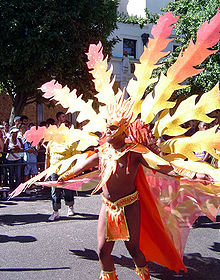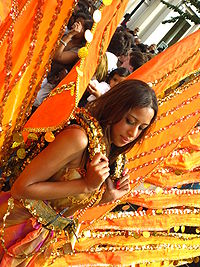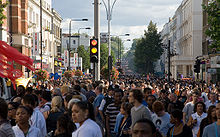- Notting Hill Carnival
-
The Notting Hill Carnival is an annual event which since 1964 has taken place on the streets of Notting Hill, Royal Borough of Kensington and Chelsea , London, UK each August, over two days (the August bank holiday Monday and the day beforehand).[1] It is led by members of the West Indian community, particularly the Trinidadian and Tobagonian British population or 'Trinis', many of whom have lived in the area since the 1950s. The carnival has attracted up to 2 million people in the past[citation needed], making it the second largest street festival in the world[2] after the Rio Carnival held in Brazil.[3]
Contents
History
The roots of the Notting Hill Carnival come from two separate but connected strands. The Carnival began in January 1959 in St Pancras Town Hall as a response to the depressing state of race relations at the time; the UK's first widespread racial attacks (the Notting Hill race riots) had occurred the previous year. This carnival organised by Claudia Jones (a "Trini") who is widely recognised as 'the Mother of the Notting Hill Carnival', was a huge success, despite being held indoors. The other important strand was the "hippie" London Free School inspired festival that became the first organised outside event in August 1966. The prime mover was Rhaune Laslett,[4] who was not aware of the indoor events when she first raised the idea. This was a more diverse Notting Hill event to promote cultural unity. A street party for neighbourhood children turned into a carnival procession when Russell Henderson's steel band (who had played at the earlier Claudia Jones events) went on a walkabout.[5]
The carnival's traditional starting point has been Emslie Horniman's Pleasance in nearby Ladbroke Grove.[6][7]
As the carnival had no permanent staff and head office, the Mangrove restaurant in Notting Hill, run by another Trinidadian, Frank Crichlow, came to function as an informal communication hub and office address for the carnival's organisers.[8] By 1976, the event had become definitely Caribbean in flavour, with around 150,000 people attending. However, in that year and several subsequent years, the carnival was marred by riots, in which predominantly Caribbean youths fought with police — a target due to the continuous harassment the population felt they were under.[9] During this period, there was considerable coverage of the disorder in the press, which some felt took an unfairly negative and one-sided view of the carnival. For a while it looked as if the event would be banned. Prince Charles was one of the few establishment figures who supported the event.
In recent years, the event has been much freer from serious trouble and is generally viewed very positively by the authorities as a dynamic celebration of London's multi-cultural diversity, though dominated by the Caribbean culture in the best traditions of Rio. However, there has been controversy over the public safety aspects of holding such a well-attended event in narrow streets in a small area of London.
Concerns about the size of the event resulted in London's former Mayor, Ken Livingstone, setting up a Carnival Review Group to look into "formulating guidelines to safeguard the future of the Carnival".[10] An interim report by the review resulted in a change to the route in 2002. When the full report was published in 2004, it recommended that Hyde Park be used as a "savannah"; though this move has attracted some concern that the Hyde Park event may overshadow the original street carnival.[11]
In 2003, the Notting Hill Carnival was run by a limited company, the Notting Hill Carnival Trust Ltd. A report by the London Development Agency on the 2002 Carnival estimated that the event contributes around £93 million to the London and UK economy.
In 2005, entrants from the Notting Hill Carnival participated in the Bridgwater, Somerset, carnival - Europe's largest lighted carnival and part of the West Country Carnival circuit.
Attendance figures
- 2011 - 1,000,000+ BBC report
- 2010 - 1,000,000+ BBC report
- 2009 - 720,000 BBC report
- 2008 - 850,000 BBC report
- 2007 - 850,000 (250,000 Sunday | 600,000 Monday)[12]
- 2006 - 1,000,000 (500,000 Sunday | 500,000 Monday) organizers / 800,000 (300,000 Sun | 500,000 Mon) authorities[13]
- 2005 - 750,000
- 2004 - 750,000
- 2003 - 600,000
- 2002 - 1,400,000
- 2001 - 1,250,000
- 2000 - 1,500,000
- 1999 - 1,400,000
- 1998 - 1,150,000
- 1997 - 1,300,000
- 1996 - 1,000,000
- Main Source (1996-2005):[14]
Public order
Since the carnival did not have local authority permission, initial police inmvolvement was aimed at preventing it taking place at all, which resulted in regular confrontation and riots. A change of policy came after a confrontation in 1987, which saw a change to allowing the Carnival to take place with police taking a more conciliatory approach. During the 2000 Carnival, two men were murdered and future policing, whilst conciliatory, has led to police deployment in large numbers - upwards of 11,000. Some of the crime associated has been displaced to the periphery. In 2007, two teenagers were shot just outside the Carnival area. The Review in 2000 by participants (but not local residents) resisted calls from the Mayor of London to resite the event in Hyde Park but led to the parades taking a circular rather than linear route.
The 2008 Carnival was marred by rioting right at the very end of the weekend, involving large numbers of youths and injuries to police. Some media outlets captured footage of the violence - [15], approximately 500 youths were arrested. The carnival has come under criticism for its cost to the London taxpayer as the cost for policing the event totalled over £6,000,000, however, it is argued that this should be put into context as the carnival is estimated to bring in approximately £93,000,000 into the local economy.[16]
The Carnival in 2011 was seen as being relatively peaceful. Five people were arrested for a stabbing at Ladbroke Grove[17]. This person was just one of 86 people who were taken to hospital. In total 245 people were detained by police over the two days of the carnival[18]
Five murders have taken place since 1987:
- 30 August 1987 - Michael Augustine Galvin, 23, stallholder - stabbed.[19]
- 26 August 1991 - Nicholas John Hanscomb, 38, bled to death after being stabbed in the thigh.[20]
- 28 August 2000 - Greg Fitzgerald Watson, 21, stabbed to death after an argument over food.[21]
- 28 August 2000 - Abdul Munam Bhatti, 28, beaten to death in a racially motivated attack by a group of 40-50 youths.[22]
- 30 August 2004 - Lee Christopher Surbaran, 27, shot by a gang using a machine pistol for "showing disrespect".[23]
See also
- Leeds West Indian Carnival (also known as the 'Chapeltown Carnival')
- St Pauls Carnival
Gallery
-
Notting Hill carnival 2005
References
- ^ BBC - 1Xtra - Black History - 1965
- ^ Security Tight At Notting Hill Carnival |Sky News|UK News
- ^ Costumes of the Carnival | Notting Hill Carnival | August 26-27 2007
- ^ Carnival Roots - Stephen Spark in Soca News
- ^ The politics of partying - Gary Young, The Guardian
- ^ "Emslie Horniman's Pleasance". The Royal Borough of Kensington and Chelsea. http://www.rbkc.gov.uk/leisureandlibraries/parksandgardens/yourlocalpark/emsliehornimanspleasance.aspx. Retrieved 2010-12-03.
- ^ "Emslie Horniman's Pleasance: Enchanted gardens". unlike.net. http://london.unlike.net/locations/302607-Emslie-Horniman-s-Pleasance. Retrieved 2010-12-03.
- ^ Abner Cohen (1993). Masquerade politics: explorations in the structure of urban cultural movements. University of California Press. p. 109. ISBN 978-0-520-07838-3. http://books.google.com/books?id=Anndpyfilk4C&pg=PA109. Retrieved 19 August 2011.
- ^ Griffiths, Emma (25 August 2006). "Remembering the Notting Hill riot". BBC News. http://news.bbc.co.uk/1/hi/england/london/5275542.stm.
- ^ Mayor of London - Notting Hill Carnival Review Group
- ^ Colourful : Weekday Edition
- ^ "Carnival crowds take to streets". BBC News. London. 27 August 2007
- ^ "500,000 party at London carnival". BBC News. London. 28 August 2006.
- ^ London Carnival 2005 News
- ^ http://news.sky.com/skynews/Home/video/Notting-Hill-Carnival-Violence/Video/200808415086822?lpos=video_Article_Related_Content_Region_1&lid=VIDEO_15086822_Notting_Hill_Carnival_Violence
- ^ http://www.london.gov.uk/view_press_release.jsp?releaseid=3387
- ^ http://www.guardian.co.uk/uk/2011/aug/30/notting-hill-carnival-arrested-stabbing
- ^ http://www.bbc.co.uk/news/uk-england-london-14716306
- ^ "Police informer is jailed for perjury over knife murder: Testimony led to man's life sentence for killing of stallholder at 1987 Notting Hill Carnival". The Independent (London). 2 July 1993. http://www.independent.co.uk/news/uk/police-informer-is-jailed-for-perjury-over-knife-murder-testimony-led-to-mans-life-sentence-for-killing-of-stallholder-at-1987-notting-hill-carnival-1482349.html.
- ^ http://archive.thisislancashire.co.uk/2000/9/7/715443.html
- ^ Carnival murder footage released
- ^ 'Racial motive' for carnival murder
- ^ Criminal Information Bureau
External links
- Notting Hill Carnival
- Notting Hill Carnival Information 2010
- LONDON PIXELS Carnival 2008 Photo set
- LONDON PIXELS Carnival 2007 Photo set
- Notting Hill Carnival Photo archive by Timothy N. Holt
- Photos of Notting Hill Carnival by Dancette Jérôme.
- Yeah, Mon! Highlights of the 2009 Notting Hill Carnival, documentary presented by the AFRICAN CONNECTIONS RESEARCH AND EDUCATION FUND ([http://www.africanconnections.com ACREF)
- Moving Map of Carnival route
- Information on the Notting Hill Carnival
- Yaa Asantewaa carnival arts group
- LONDON 2010 Video set
- History of the Carnival
Categories:- Carnivals in the United Kingdom
- Festivals in London
- Annual events in London
- Parades
- Black British culture
- Recurring events established in 1966
Wikimedia Foundation. 2010.







